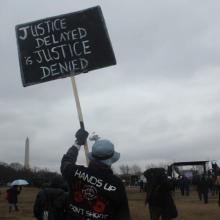Rev. Al Sharpton

Dr. Deborah Turner of the League of Women Voters (LWV), Rabbi Jonah Pesner of Religious Action Network, Virginia Kase Solomón of LWV, Rev. Melvin Wilson of Saint Matthew AME Church, and Ben Jealous of People for the American Way lead a civil disobedience action during a voting rights rally at the White House. LWV, People for the American Way, Black Voters Matter, and many other organizations hosted the rally to pressure Congress and President Biden to protect voting rights after many states passed laws to make voting more difficult for minorities. Photo by Allison Bailey/NurPhoto via Reuters.
The House of Representatives passed HR 4, known as the John Lewis Voting Rights Advacement Act, 219-212, which faith leaders and other voting rights advocates believe is a crucial step in voter protection.
“Tireless hours by members of Congress and civil rights leaders have brought the issue of federally mandated voter suppression to the forefront of conversations around American democracy,” Rev. Al Sharpton said in a news release through March On For Voting Rights. “This is only the start of the fight to move farther and farther away from the Jim Crow Era.”
On the 54th anniversary of the “I Have a Dream” speech, the voice of Dr. Martin Luther King Jr. echoed across the lower end of the National Mall as thousands of clergy gathered in Washington, D.C., to march for racial justice. The Ministers March for Justice brought together faith leaders of many traditions to speak out against racism and white supremacy, and sought to call the government to accountability.
Crying out “no justice, no peace,” crowds joined the Rev. Al Sharpton in a weekend march towards the Martin Luther King Jr. Memorial, vowing not to let President-elect Donald Trump turn back strides made by the civil rights leader.
The mostly African-American throng — smaller than the thousands expected, due to the steady rain — heard from civic and religious leaders about key areas of concern: health care, voting rights, economic equality, and police brutality and reform.
Civil rights leader the Rev. Al Sharpton told a packed church on August 17 that the Michael Brown case would mark a defining moment in civil rights history and fundamentally change the way police engage with the African-American community.
“Michael Brown is going to change this town,” Sharpton said to a massive, boisterous crowd that clapped and shouted in response.
Hundreds filled the pews of Greater Grace Church. More crowded into the foyer, and hundreds remained on the parking lot unable to enter, all in a show of support for the African-American teenager who was shot by a police officer on August 9.
Sharpton announced a future march in Washington on policing. He criticized the militarization of police, saying they act as if they are “at war with…citizens.” Sharpton urged the crowd to start showing up at the polls to vote and make a difference in the lives of African-Americans.
“Nobody can go to the White House unless they stop by our house,” Sharpton said. “We’ll be here until justice is achieved.”
Sapped by three weeks of a water-only diet, three activists for immigration reform ended their fasts Tuesday with a morsel of bread blessed by a priest and “passed the fast on” to others who hope to keep attention focused on the issue.
“You have truly put your faith in action,” said retired Washington Archbishop Theodore McCarrick, one in a small crowd of political and clerical dignitaries who came to the National Mall to praise those who have gone without food in a bid to pressure Republican House leaders to pass an immigration reform bill.
Also seated alongside the quiet and wan fasters: House Minority Leader Nancy Pelosi; the Rev. Bernice King, the daughter of the Rev. Martin Luther King Jr.; Secretary of Labor Tom Perez; Rep. John Lewis, D-Ga.; and the Rev. Al Sharpton.
In recent weeks, the fasters have attracted high-profile visitors, including President Obama, first lady Michelle Obama, and Vice President Joe Biden, to the heated tents where the fasters have been living on the National Mall.



